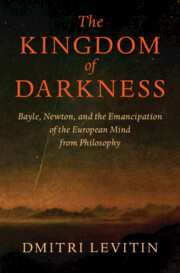Book contents
- The Kingdom of Darkness
- The Kingdom of Darkness
- Copyright page
- Contents
- Preface
- Abbreviations and Conventions
- General Prologue
- Part I Giving Up Philosophy
- I Prolegomena
- I.1 Emancipating Natural Philosophy from Metaphysics
- I.2 Emancipating Theology from Philosophy
- I.3 Reconstructing the Pagan Mind in Seventeenth-Century Europe
- Part II Pierre Bayle and the Emancipation of Religion from Philosophy
- Part III Isaac Newton and the Emancipation of Natural Philosophy from Metaphysics
- Part IV The European System of Knowledge, c.1700 and Beyond
- Bibliography
- Index
I.1 - Emancipating Natural Philosophy from Metaphysics
from Part I - Giving Up Philosophy
Published online by Cambridge University Press: 23 March 2022
- The Kingdom of Darkness
- The Kingdom of Darkness
- Copyright page
- Contents
- Preface
- Abbreviations and Conventions
- General Prologue
- Part I Giving Up Philosophy
- I Prolegomena
- I.1 Emancipating Natural Philosophy from Metaphysics
- I.2 Emancipating Theology from Philosophy
- I.3 Reconstructing the Pagan Mind in Seventeenth-Century Europe
- Part II Pierre Bayle and the Emancipation of Religion from Philosophy
- Part III Isaac Newton and the Emancipation of Natural Philosophy from Metaphysics
- Part IV The European System of Knowledge, c.1700 and Beyond
- Bibliography
- Index
Summary
This chapter charts the way in which the study of nature was made increasingly less philosophical between 1500 and 1700. At the start of the period, natural philosophy was largely conducted as a form of ‘metaphysical physics’. The erosion of this approach was driven by three factors: 1) the impact of humanist critique; 2) The colonisation of natural philosophy by physicians; 3) The colonisation of natural philosophy by mixed mathematicians. Despite a spirited fightback from the metaphysicians, by the middle of the seventeenth century the anti-metaphysical physicians and mixed-mathematicians – often operating in tandem – had won. A major concomitant of this is that the idea that most of seventeenth-century natural philosophy was grounded in ontological mechanism is wrong. To the extent that natural philosophers were mechanists, they were operational mechanists, who modelled nature on machines but refused to commit to an ontological reductionism, and often directly opposed it. In this and other respect, Descartes and his followers, far from being representative of seventeenth-century natural philosophy, were outliers.
- Type
- Chapter
- Information
- The Kingdom of DarknessBayle, Newton, and the Emancipation of the European Mind from Philosophy, pp. 25 - 119Publisher: Cambridge University PressPrint publication year: 2022

